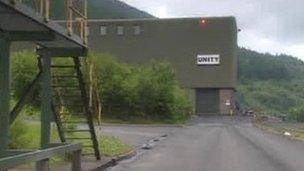Talks over future of Unity Mine after it enters administration
- Published

It is expected that the current workforce will be maintained until further notice
Managers and workers at Wales' largest mine are meeting after its owners said they were filing for administration.
The future of the Unity Mine, a drift mine near Neath, has been uncertain after management said they only had work for 66 of its 220 staff.
Director Richard Nugent said the firm was "forced into the process of filing for administration" but the workforce is being kept on for now.
Business Minister Edwina Hart said the firm was being offered assistance.
But she said there were wider financial pressures and challenges which had led to the company going into administration.
She added: "However, discussions with third party investors are on-going, and I welcome the director's intention to protect the current work force while fundraising negotiations are continuing with various parties to seek to secure the long term future of the mine and its highly skilled workforce."
Potential reserves
Wayne Thomas from the National Union of Mineworkers (NUM) said he believes there is a future for the mine.
He said: "I think many people who know the investment to date and the infrastructure of the coal mine and certainly those who are aware of the potential reserves for this mine, they would know there's a future for this mine.
"We believe there's at least 10, 15, 20 years work here. We believe those reserves are attainable.
"I'm convinced in my mind that a solution can be resolved in the longer term and the sooner we get to that the better."
In recent months, the miners were told there was not enough work for everyone.
Staff offered to share shifts between all of the workers which meant they got on average a quarter of their previous pay.
It was seen as a way of safeguarding the pit's future, but it is understood some workers have had to leave their jobs and taken up posts as far as way as Kent and Manchester.
A meeting is due to take place with the mine's 22 apprentices later and the entire workforce will meet next week as administrators are appointed.
Blaengwrach community councillor John Price, who sits on the Unity liaison committee, said the announcement was "devastating".
"It was a big shock, make no mistake about that," he told BBC Radio Wales.
'Fallen over backwards'
"We fully expected it to carry on, on a limited scale until the situation with coal sales improved and then it would revert to normal.
"But it doesn't look as if it's going to go that way now."
He added: "If they can get more investment or be taken over on a buy-out it will be an excellent thing for us.
"Our MP [Peter Hain] has fallen over backwards in getting licences and planning permissions hurried through Neath Port Talbot council for Unity mine because they applied to work on opencast on top of the mountain to help out with coal coming down from there.
"Apparently that is all systems go now but then comes along this announcement and it's devastating."
Meanwhile, Welsh government officials are continuing to hold talks with the mine's management to try to find a solution.
In September 2012 the BBC reported 94% of all Welsh coal came from opencast sites, the remainder from drift mines.
The vast majority work was at two pits in the Neath Valley at Unity and Aberpergwm which is currently closed.
Unity Mine opened in 2007 with reserves of up to 90 million tonnes of coal.
It is a drift mine, which means that miners can walk into it from the surface rather than having to be transported down to the coal seams via a lift in a shaft.
Tata steelworks and Aberthaw power station use about 80% of Welsh coal.
- Published10 October 2013
- Published4 October 2013
- Published14 September 2012
- Published23 August 2013
- Published8 January 2013